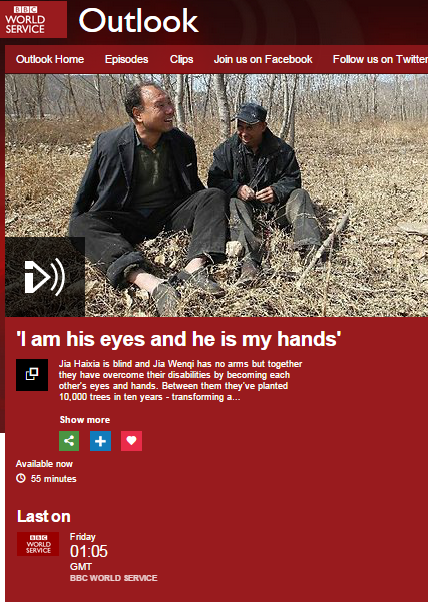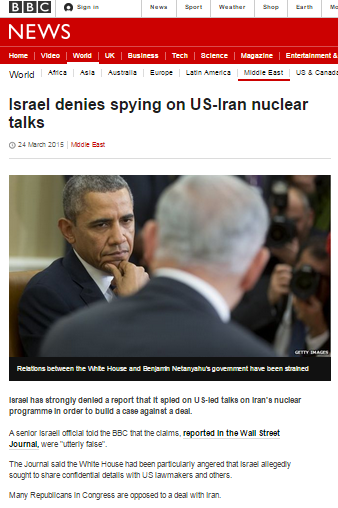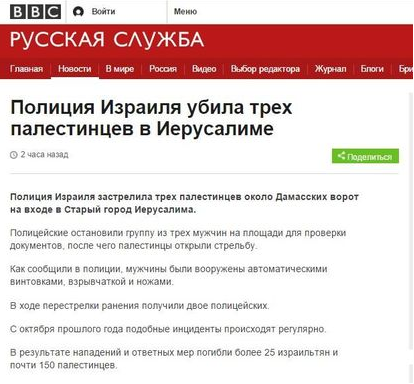Sadly, there is nothing novel about context-free BBC promotion of the Anti-Israel Boycott, Divestment and Sanctions campaign (BDS) and its proponents. But whilst that political crusade to bring about the demise of Jewish self-determination by means of delegitimisation and demonization is not infrequently directly or indirectly amplified in BBC programming, the corporation inevitably refrains from informing its audiences exactly for what its ‘one-stater’ supporters are campaigning.
“With pressure imposed by the international community through a BDS campaign a la anti-Apartheid campaign which brought Apartheid South Africa to an end, we believe that Israel itself can be transformed into a secular democratic state after the return of 6 million Palestinian refugees who were ethnically cleansed in 1948, a state for ALL of its citizens…therefore, we think that one of the major tools of the struggle towards a secular democratic state is BDS.” Haider Eid, 2009
“So BDS does mean the end of the Jewish state…I view the BDS movement as a long-term project with radically transformative potential… the success of the BDS movement is tied directly to our success in humanizing Palestinians and discrediting Zionism as a legitimate way of regarding the world.” Ahmed Moor, 2010
“BDS represents three words that will help bring about the defeat of Zionist Israel and victory for Palestine.” Ronnie Kasrils, 2009
Concurrently, the BBC also often falls short of its own Editorial Guidelines on impartiality by failing to clarify that interviewees are involved with the BDS campaign and/or additional anti-Israel political activities. Such was the case on April 17th when the BBC World Service radio programme ‘Outlook’ interviewed Dervla Murphy – correctly introduced by presenter Matthew Bannister as a travel writer, but with no mention made of her equally relevant anti-Israel political activities.
The programme’s synopsis – which is similar to the verbal introduction – reads:
“In 1963, Dervla Murphy left her tiny village of Lismore in Ireland to fulfil a childhood ambition to cycle all the way to India. It was the first of many epic journeys on a shoestring which she turned into best-selling books. Now in her eighties, Dervla has been to destinations as far apart as Siberia, Peru, Cameroon and Tibet. Her latest book tells of spending months living in Israeli settlements and refugee camps in the Palestinian territories.”
Most of the interview (available from 09:15 here) relates to other topics but from 19:28 listeners heard the following:
Bannister: “What took you to Israel and the Palestinian territories? I think you’ve been back there in 2008, 2009, 2010, 2011. You’ve even lived in a refugee camp. What took you to that part of the world?”
Murphy: “Well I suppose that is a bit like the impulse that sent me to the north of Ireland and then of course it became much more complicated because, you know, I realized that our world – the West if you like – we really bear a lot of the guilt for how the Palestinians are ill-treated. So I mean it’s one hell of a mess.”
Bannister: “What did you think that your contribution was going to be to the debate because so many words have been spoken and written about that area? What did you feel when you set out to live there for long periods of time that you would be able to add?”
Murphy: “Well I didn’t think that I would be able to add anything in the way of information or insights; anything like that. But why I wrote the two books is because friends said to me ‘well yes; there are hundreds – thousands probably – of really, really good well-researched, well-written books on this theme but if you write a book on the same theme – just your own experiences – it’s possible that you will be able to reach a readership that is not interested in the problems’. I mean the world is so full of problems [laughs]. But, you know, that because they happen to like my travel books, they would read it and therefore the understanding would be widened.”
Bannister: “I understand”.
In other words, the political aims behind Murphy’s book promoted in this programme are clearly of prime importance and of course some insight into those motivations would have helped listeners put the unchallenged simplistic claim that “Palestinians are ill-treated” into its appropriate context.
“In all the countries I’ve visited,” she told me, “that is the only one where I felt it was my actual duty as a writer not to be neutral. Not to play this game of… we must look at this, look at that. We must only look at the fact that the Palestinians are treated utterly outrageously.” But each side, she says, must relinquish a dream in return for peace: the one-state solution is the only answer. “The Palestinians have to give up any notion of having their own separate, independent state, just as the Israelis have to give up having their Jewish-only state… In a sense that’s a good beginning: they both have to give up.”
As one reviewer of Murphy’s previous book about the Gaza Strip put it:
“…it is evident that this is not a travel book at all. The genre has a tendency towards self-indulgence, but there is at least a convention that the reader goes on a psychological, spiritual or political journey with the author as he or she is changed by the otherness of the experience of being somewhere else. There is none of that here. This is a travelogue entirely without a journey. Dervla Murphy has decided what she thinks about the Israel-Palestine conflict long before she sets foot in Gaza and everything she experiences merely reinforces her view that Zionism is a colonial disease that lives only to spread its poison.”
So here we have yet another example of the BBC’s casual mainstreaming of anti-Israel political activism by means of context-free promotion of its inadequately introduced proponents and their activities. We learn that the BBC apparently has no qualms about giving free promotion to a book designed to spread the propaganda of a campaign seeking to destroy a sovereign state and thus deny self-determination to a specific group of people. We might of course ponder the question of whether the corporation would be similarly eager to add its weight to the promotion of a campaign to revoke the basic rights of any other group of people.




